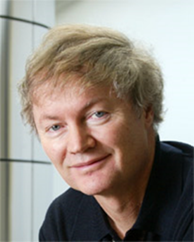
报告题目: Molecular Modulators Enhance the Performance and Stability of Perovskite
时 间:2018年8月2日10:00-12:00
地 点:武汉光电国家研究中心A101
报 告 人:Prof. Michael Graetzel, EcolePolytechniqueFederale de Lausanne, Swissland
报告人简介:
Professor of Physical Chemistry at the EcolePolytechniqueFédérale de Lausanne, Michael Graetzel directs there the Laboratory of Photonics and Interfaces. He pioneered research in the field of energy and electron transfer reactions in mesoscopic systems and their use in energy conversion systems, in particular photovoltaic cells and photo-electrochemical devices for the splitting of water into hydrogen and oxygen and the reduction of carbon dioxide by sunlight as well as the storage of electric power in lithium ion batteries. He discovered a new type of solar cell based on dye sensitized nanocrystalline oxide films which successfully mimic the light reaction occurring in green leafs and algae during natural photosynthesis. Dye sensitized solar cells (DSSCs) are currently produced by industry and sold commercially on the megawatt scale as light-weight flexible cells for powering portable electronic devices and as electricity producing glass panels for application in building integrated photovoltaics. The DSSC has engendered perovskite solar cells (PSCs) that have revolutionized the whole field of photovoltaics reaching over 22% efficiency only a few years after their inception. This exceeds the performance of polycrystalline silicon solar cells.
Author of several books and over 1200 publications that received some 180’000 citations (h-factor 196) he is one of the 3 most highly cited chemists in the world. His recent awards include the Paracelsus Prize of the Swiss Chemical Society, the King Feisal International Science Prize, the Samson Prime Minister’s Prize for Innovation in Alternative Fuels, the First Leigh-Ann Conn Prize in Renewable Energy, the Albert Einstein World Award of Science, the Marcel Benoist Prize, the Paul Karrer Gold Medal, the Gutenberg Research Award, the Millennium Technology Grand Prize, and the Balzan Prize. Other prestigious awards include the Galvani Medal, the Faraday Medal, the Harvey Prize, the Gerischer Award, the Galileo Galilei Award, the City of Florence Award of the Italian chemical Society, the Dutch Havinga Award and Medal, the International Prize of the Japanese Society of Coordination Chemistry, the ENI-Italgas Energy-Prize and the year 2000 European Grand Prix of Innovation.
He graduated as Doctor of Natural Science (Dr.rer.nat.) from the Technical University of Berlin and received 10 honorary doctors degrees from Asian and European Universities. He is a member of the Swiss Chemical Society and an elected member of the German Academy of Science (Leopoldina) as well as Honorary member of the Israeli Chemical Society, the Bulgarian Academy of Science and the SociétéVaudoise de Sciences Naturelles. Recently he was named Honorary Fellow of the Royal Society of Chemistry (UK). He has been the Mary Upton Visiting Professor at Cornell University and a Distinguished Visiting Professor at the National University of Singapore. He was an Invited Professor at the University of California at Berkeley, the EcoleNormaleSupérieure de Cachan (Paris) and Delft University of Technology. In 2009 he was named Distinguished Honorary Professor by the Changchun Institute of Applied Chemistry and Huazhong University of Science and Technology. He also was elected by the Chinese Academy of Science to be the 2011 Albert Einstein Professor. He is presently a Distinguished Visiting Chair Professor and Honorary Director of SAINT (Sung Kyun Kwan University Advanced Institute of Nano Technology) in Seoul Korea, a Visiting Professor at NTU Singapore and a Max Planck Fellow at the Max Planck Institute for Solid State Research in Stuttgart Germany.